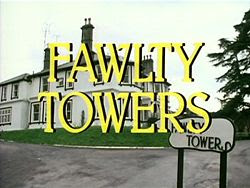You started it!
Series 1 Episode 6 – The Germans, Fawlty Towers
—————————————-
When Sybil is out of action in hospital, Basil is left to cope with his shabby hotel (in Torquay) in her absence. What could go wrong when there’s a fire drill scheduled, a moose’s head to hang and a party of German tourists due? Quite a lot really, but it will all be fine as long as… you don’t mention the war.

Many people quote “The Germans” as their favourite episode of Fawlty Towers and, while I would pick another (The Rat), those sequences between Mr Basil Fawlty (John Cleese) and the German tourists are certainly among the most memorable of the series.
Direct quotes from this episode:
Basil [who keeps making Freudian slips about the war]: Is something wrong?
German Guest: Will you stop talking about the war?
Basil: Me? You started it! [referring to WWII]
German Guest: We did not start it. [referring to the conversation about the war]
Basil: Yes you did, you invaded Poland.
Speaking of starting it, I was challenged in a conversation a little while back as to which political party in the US was more responsible for starting wars. The supposition was that the Republican hawks were more prone to engage in war than the Democrats. When I mentioned a few top of mind wars (WWI, WWII, Korea…) as having a Democratic president at the outset of the war, it led me to investigate further. In the last 38 years, each significant engagement/war has indeed been started by Republican presidents (you also have to bear in mind that a Republican president has been in office 28 of those 38 years).
There should be at least four qualifiers before attempting to come to a conclusion. (1) What would be more interesting perhaps is to look at which party was dominating Congress at the times when the meaty decisions/approvals were made… (2) A second consideration is whether the war can be judged to have been a “good” or “necessary” war. (3) What was the outcome? And (4), who was responsible for carrying out and/or ending the war?
 Anyway, I have put together a list of most the more significant wars since the 19th century (and I have chosen to include all the recent wars). A more rigourous and comprehensive study would have to go into all the wars (definition of “war” needing to be clarified). I have not touched the wars with the Indians for example. The list of all military wars/engagements involving the USA has been made over on Wikipedia here. In any event, if you look at the associated presidents below, it is not exactly conclusive as to which party is more likely to declare war.
Anyway, I have put together a list of most the more significant wars since the 19th century (and I have chosen to include all the recent wars). A more rigourous and comprehensive study would have to go into all the wars (definition of “war” needing to be clarified). I have not touched the wars with the Indians for example. The list of all military wars/engagements involving the USA has been made over on Wikipedia here. In any event, if you look at the associated presidents below, it is not exactly conclusive as to which party is more likely to declare war.
War of 1812
Begun and ended 1814 by James Madison (Democratic Republican, precursor of Democratic Party ironically)
Mexican-American War 1846-1848
Started and ended by James Polk (D)
Spanish-American 1898
Started and ended by McKinley (R)
Philippine-American War 1899
Started and ended by McKinley (R)
WWI 1914-1918
Started and ended by Woodrow Wilson (D) who declared war on Germany in April 1917
WWII 1939-1945
Started under Roosevelt (D) 1941
Ended under Truman (D) 1945
Korea 1950-53
Started and ended by Truman (D)
Vietnam War (range of dates 1955-1975, with US involvement between 1959-1973)
Started officially in 1959 under Eisenhower (R)
Escalation under JF Kennedy (D)
War ended by Nixon (R)
Invasion of Grenada 1993 under Reagan (R)
Persian Gulf War 1990-1991
Started and ended by Bush Sr (R)
(note bombing of Iraq in 1993 by Clinton)
Afghanistan Invasion 2001-
By Bush Jr (R)
Iraq or Second Gulf War 2003…
Started by Bush Jr (R)
The only conclusion I feel like making is that, despite all the civilizing that we human beings have been doing, the net net is that military conflicts, whether borne of need for power, zeal or fear, are an ugly and consistent part of our existence. And, for sure, there are necessary wars. If the world were run by women, would it be entirely different? Female Presidents, Prime Ministers, Queens and Empresses throughout the ages have been known or associated with wars (see here for a list from womenhistory.com). Solutions to avoid an escalation in wars would include heightened education, international integration and, most importantly, increased prosperity. However, given the current and foreseeable economic crises and the hardships and pressures that will inevitably arise, it would seem more likely that we are in store for more conflicts than less in the near future. And, that’s when I take refuge in Fawlty Towers, and return to viewing Manuel being clobbered on the head about his Siberian Hamster [aka rat].
Your thoughts and comments are welcome!











Your analyses indicates that of 12 wars, 7 were started by Republicans. it is worth noting that of the 5 wars started by Democrats, 2 of them, WWI and WWII, were unquestionably just and, in both cases, the US entered as a last resort.
So an adjusted count would read Republican 7 – 3 Democrat.
QED, my friend.
It would also be interesting to consider wars that were avoided.
In other words, how often do Democrats or Republicans find a peaceful solution to a major conflict.
Would anybody, even the most ardent neo-con, through-and-through-Palin-accepting Republican, wish they had a Bush/Cheney leadership in the White House during the Cuban Missile Crisis? The thought is spine chilling.
How would Reagan have responded to the Iran hostage crisis?
Regarding the Vietnam War, to summarise events as “war ended by Nixon” is very deceptive.
I must confess that I am not an expert in this war, but I’ve been led to understand that Nixon sabotaged peace negotiations in 1968 for political gain [1] and that the terms of the Paris Peace Accords, signed in 1973 by the Nixon administration, hardly differed from those being negotiated by Johnson’s administration.
Painfully, the majority of US casualties between 1956 and 1972, happened between 1968 and 1972; 65% to be precise (37,287 of 56,847) [2]. The proportion of civilian deaths during this period must be even more accentuated since it was Nixon who authorized massive bombing operations.
[1] “On May 10, 1968, despite low expectations, peace talks began between the U.S. and the Democratic Republic of Vietnam. Negotiations stagnated for five months, until Johnson gave orders to halt the bombing of North Vietnam. The Democratic candidate, Vice President Hubert Humphrey, was running against Republican former vice president Richard Nixon. Through an intermediary,Anna Chennault, Nixon advised Saigon to refuse to participate in the talks until after elections, claiming that he would give them a better deal once elected. Thieu obliged, leaving almost no progress made by the time Johnson left office.”
http://en.wikipedia.org/wiki/Vietnam_War
[2] http://www.archives.gov/research/vietnam-war/casualty-statistics.html#year
WW1 ” unquestionably just ” Are you serious. From all sides it was unquestionably a war of Empires (read corporations these days ) where millions of working class people were sacrificed for nothing more than the greed of the elite. Read real History.
America did not start the Iraq war, we responded to being attacked or have you forgotten about the Twin Towers and Pentagon, not to mention the truck bombing of our Marines in Lebanon.
Bottom line, the GOP is a more hawkish party, on balance, and I would have to believe the numbers play out if you evaluate ALL the US wars. The issue going forward is whether we can avoid more conflicts … and, in the current geopolitical situation and financial crises, that will require the the coordination of the world forces. Hopefully, the next D president will provide a stabilizing factor!
“Fawlty Towers”…..Rain, rain go to Spain TVFilm?
Odd, dividing up presidents like chocolate and vanilla and who orders the ice cream and who pays for the ice cream. Good wars, bad wars. Who started the war and who ended it. Why study history when we could just read your blog?
So Truman started the Korean War? I thought the N Koreans started it when they crossed the 38th parallel.
So Eisenhower started Vietnam war and it had nothing to do with the Truman Doctrine?
In your mention of the Vietnam war you omit Lyndon Johnson. Like forgetting John Lennon when listing the names of the Beatles.
Rodrigo.. You can't get away from bashing Nixon regarding his alleged interference in the Vietnam peace process. It might be noted that Obama was accused of the very same tactic in his run for the presidency. The Nixon accusation is hearsay at best… "The precise nature of any communication between Nixon's allies and the South Vietnamese government isn't revealed in the tapes — nor is the way Johnson and his advisers learned of them." http://www.statesman.com On the other hand, we can put Obama in Iraq, talking with the Iraq leaders, at the time of the alleged meddling. The irony and similarity between Nixon and Obama doesn't end there. They both pledged to end the war(s) during their election campaigns and went on the postpone the ending or even escalate the conflicts. Oh well, anything to get elected. The indifference Obama shows to the "wars he inherited" will have to change soon as they did with Nixon. They will become his wars.
Rodrigo…
Would anybody, …wish they had a Bush/Cheney leadership in the White House during the Cuban Missile Crisis?
John Kennedy would not recognize the Democrat party of today. He was a commie fighter, pro military, tax cutting, stare down, non-appeaser, probably pro-life catholic, president and would have been a right-of-center Republican if he were alive today. I doubt you could argue that if Obama had been president during the Cuban missile crisis there would not be ICBMs in Cuba today. Peace in our time.
Rodrigo…
How would Reagan have responded to the Iran hostage crisis?
Didn't have to. The very thought of a US president willing and unafraid to use the most powerful army ever assembled against Iran was enough to end the hostage crisis. I think even today's watered down history will support me on that one.
And finally, you both completely disregard the harm done in not entering into an inevitable conflict. Had Roosevelt delayed the US entry into WWII any later than he did there might not have been a launching base for the D-Day invasion. For this we credit not FDR but the Japanese. (if you can't handle history books, see "Star TreK ("The City on the Edge of Forever") A delayed conflict with N Korea or Iran until after they have Nukes would potentially be a very big mistake.
Don't get me wrong. The world needs well-meaning pacifists such as yourself. Just remember that even the heroes of your own democrat party directly orchestrated the most violent commitment to total warfare this planet has ever seen.